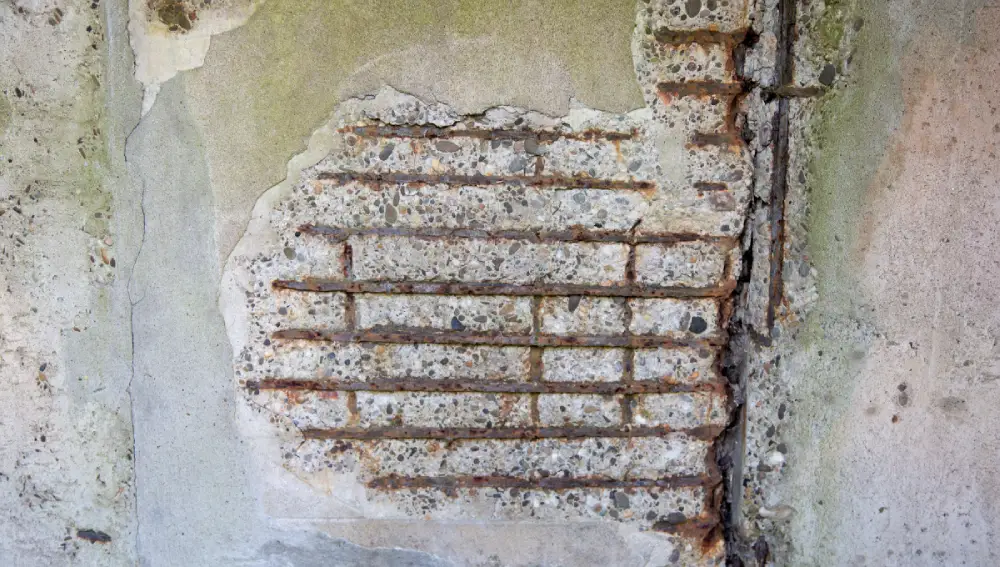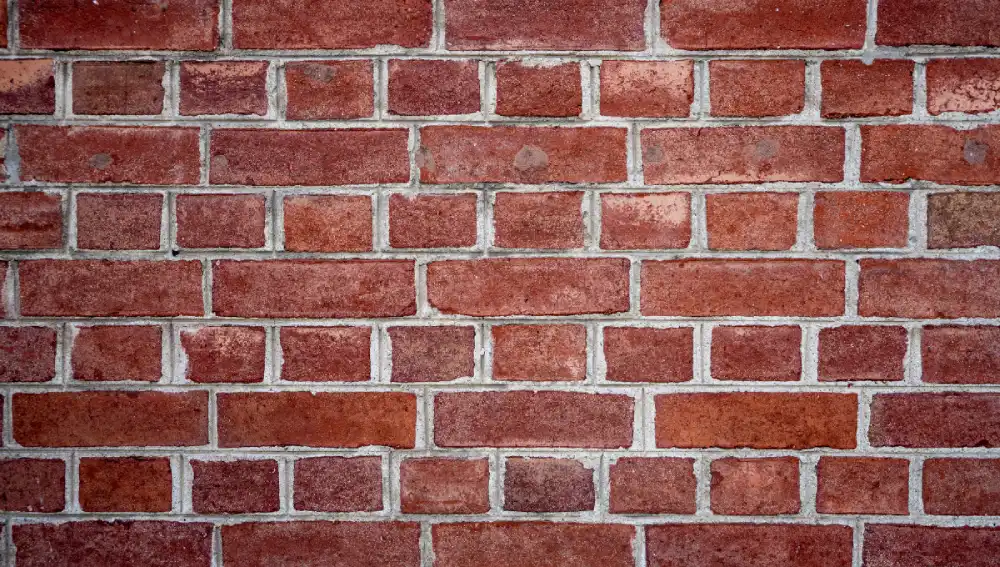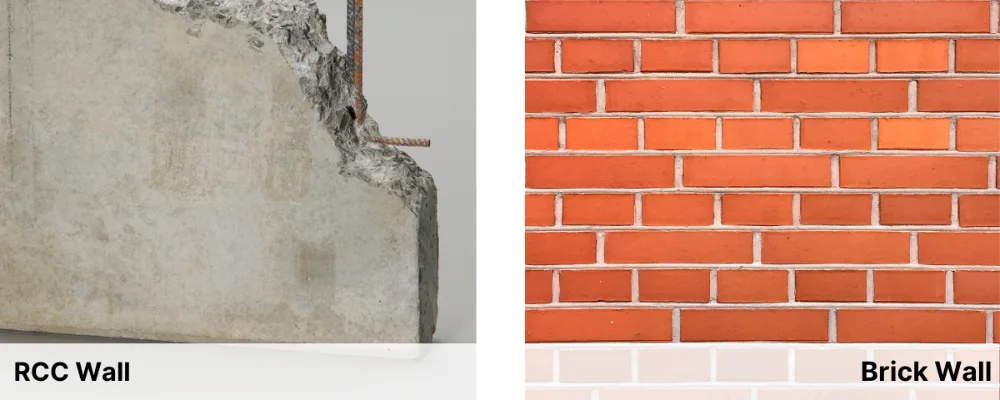Wall construction is a crucial aspect of building design. The choice between RCC and brick walls significantly influences a building’s structure, insulation, soundproofing, appearance, and budget. RCC walls offer superior strength and durability, which is ideal for load-bearing structures. Brick walls provide better insulation and sound reduction. Aesthetically, both offer versatility, but RCC tends to be more modern. Cost-wise, brick walls are generally more economical for construction. Ultimately, the best choice depends on building purpose, climate, budget, and design preferences. Read on to learn the differences between the two types, so that you can make an informed decision for your home construction.
What is an RCC Wall?

An RCC, a Reinforced Cement Concrete wall, is a strong structural element that combines concrete with steel rebars for tensile strength. This powerful combination makes the wall capable of withstanding heavy loads and external pressures.
Composition of an RCC Wall
RCC walls consist of concrete (A mixture of cement, sand, water and aggregates)
The materials listed above have steel reinforcement bars which can withstand tensile forces. Together with giving concrete protection against corrosion, steel also makes concrete stronger overall.
Key Benefits of RCC Walls
- Exceptional strength and durability
- Resistance to fire, water, and weathering
- Versatility in design and application
- Long lifespan with minimal maintenance
What is a Brick Wall?

A brick wall is a vertical structure built using bricks and mortar. Brick is a widely used material for external walls, internal partitions, and other structures.
Components of a Brick Wall
Bricks:
The fundamental units are made from clay, which consists of silica, alumina and lime. They provide structure and durability to walls.
Mortar:
Mortar is generally a cement-based or lime-based material that helps bind the bricks together for stability.
Construction Process
Bricklayers carefully lay bricks in specific patterns, applying mortar to create strong bonds. The wall can dry and cure, resulting in a robust and long-lasting structure.
Benefits of Brick Walls
- Exceptional durability and strength
- Excellent sound insulation
- Fire resistance
- Aesthetic appeal
- Low maintenance
Properties and characteristics
Structural Strength and Durability
Regarding structural integrity and durability, RCC and brick walls have their advantages.
RCC Walls:
RCC walls are known for their exceptional strength and load-bearing capacity, making them perfect for high-rise buildings and heavy structures. They are also highly resistant to moisture, termites, and even earthquakes. However, initial construction costs tend to be higher.
Brick Walls:
Brick walls offer solid load-bearing capabilities, though generally less than RCC. While they can withstand moisture and are termite-proof, they may require occasional maintenance like repointing. Known for their classic aesthetic, brick walls often come with a lower initial cost than RCC.
Construction Techniques
RCC Walls
Building RCC walls is a multi-step process. Formwork is erected to shape the wall, followed by placing steel reinforcement for strength. Concrete is then poured and cured, gaining durability over time. While this method offers superior strength and design flexibility, it demands more labour than brick walls.
Brick Walls
Brick wall construction is relatively straightforward. Bricks are laid in courses, and mortar bonds them together. The mortar cures to solidify the wall. Although less complex, skilled labour is essential for accurate alignment and structural integrity. Brick walls often provide better insulation and soundproofing than RCC walls.
Thermal and Acoustic Insulation
Thermal Insulation
RCC Walls:
RCC walls give moderate thermal insulation. While they can store heat, preventing drastic temperature swings, additional insulation is often required for optimal energy efficiency.
Brick Walls:
Generally, brick walls are excellent for thermal insulation. Bricks normally resist heat transfer, thus helping maintain cool indoor temperatures in summer and warm temperatures in winter.
Acoustic Insulation
RCC Walls:
RCC walls provide reasonable sound insulation. However, additional soundproofing measures might be necessary for environments demanding high acoustic performance, such as auditoriums offices.
Brick Walls:
Brick walls are superior in acoustic insulation. Their dense structure effectively reduces noise transmission between rooms, making them ideal for privacy and quiet spaces, especially when plastered.
Cost Comparison
RCC Walls
Building with RCC often involves higher upfront costs due to expensive materials like cement and steel and skilled labour requirements. However, RCC walls excel in durability and minimal maintenance, potentially offsetting initial expenses over the long term.
Brick Walls
Brick walls generally have a lower initial cost compared to RCC, primarily due to less expensive materials. Labour costs can vary depending on the complexity of the project. While maintenance demands, such as repointing mortar, can increase costs, brick walls often offer a more economical choice for the short term.
Factors Affecting Cost
Several factors influence the overall cost of both wall types, including:
- Material prices (fluctuating market conditions)
- Labour availability and wages
- Project location and accessibility
- Wall thickness and height
- Design complexity
- Regional climate and weather conditions
Environmental Impact
RCC Walls
Cement production for RCC walls can contribute to carbon emissions. However, advancements in construction methods are reducing the carbon footprint. RCC walls can also be designed for energy efficiency, reducing overall environmental impact.
Brick Walls
Brick walls have been a remarkable structure in construction for centuries. Whether in homes, commercial buildings or even garden walls, brick walls give a classic look that withstands the test of time.
Though it releases carbon during the firing process, bricks are long-lasting, recyclable, and can be reused, thus extending their lifespan and reducing their environmental impact.
As traditional brick-making methods are environmentally harmful, advancements in the production method can be a solution.
Aesthetic and Design Flexibility
RCC Walls
RCC walls are a blank canvas for architects and designers, as they have smooth and moldable surfaces. Because of its sleek, minimalist exterior and textured finishes, RCC can be adapted to any architectural design. It can give a unique aesthetic by including paints, cladding, or textures.
Brick Walls
Brick walls can give a classic charm and timeless look. Bricks come in various sizes, colours, and patterns, giving you versatile choices. These can be plastered or left exposed to give a rustic aesthetic.
Maintenance and Repair
RCC Walls
Common issues with RCC walls include cracks due to settling or shrinkage. Repair methods involve crack injection or surface treatments to restore structural integrity. There is a need for inspections and maintenance to be made regularly to address any problems and ensure the durability of walls.
Brick Walls
To address any deterioration in brick walls, the repointing of mortar joints is needed. The cracks and any damage to individual bricks can be addressed by replacing the affected brick and applying new mortar. Water seepage is also a common issue faced by brick walls. To protect the appearance and functionality of brick walls, regular inspection and maintenance is necessary.
Suitability for Different Applications
RCC Walls
RCC walls can be used in high-rise buildings, industrial structures, and commercial buildings because of their strength and durability. They can withstand heavy loads and seismic activity. Additionally, RCC walls offer flexibility in design, allowing for various architectural styles and shapes. Their fire resistance and water impermeability make them suitable for environments with demanding conditions.
Brick Walls
Brick walls are often preferred in residential buildings and historical buildings. They can give excellent insulation and create a comfortable environment. They are not as strong as RCC walls but provide a warm and inviting ambience.
Conclusion
Choosing between RCC Walls or Concrete Walls is a common debate in every construction project. RCC walls are very strong and mainly used where excess load-bearing capacity is required for walls. This makes them great for tall buildings and big projects. Brick walls look classic and are good at keeping noise and heat out. They are often used in homes and older buildings. When choosing between the two, think about what you need the wall to do, how much it will cost, and the look you want.
FAQs
RCC walls are generally stronger than brick walls.
Brick walls typically have lower initial costs compared to RCC walls.
Both RCC and brick walls offer excellent durability, but RCC walls are often considered more resistant to various environmental elements.
Generally, RCC walls are considered to be more harmful to the environment due to the unsustainable manufacturing methods of cement.
RCC walls are ideal for high-rise buildings, commercial structures, and applications requiring very high load-bearing capacity.

